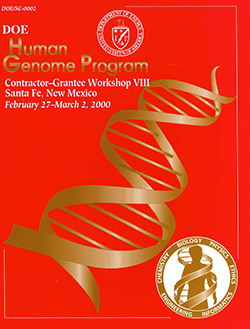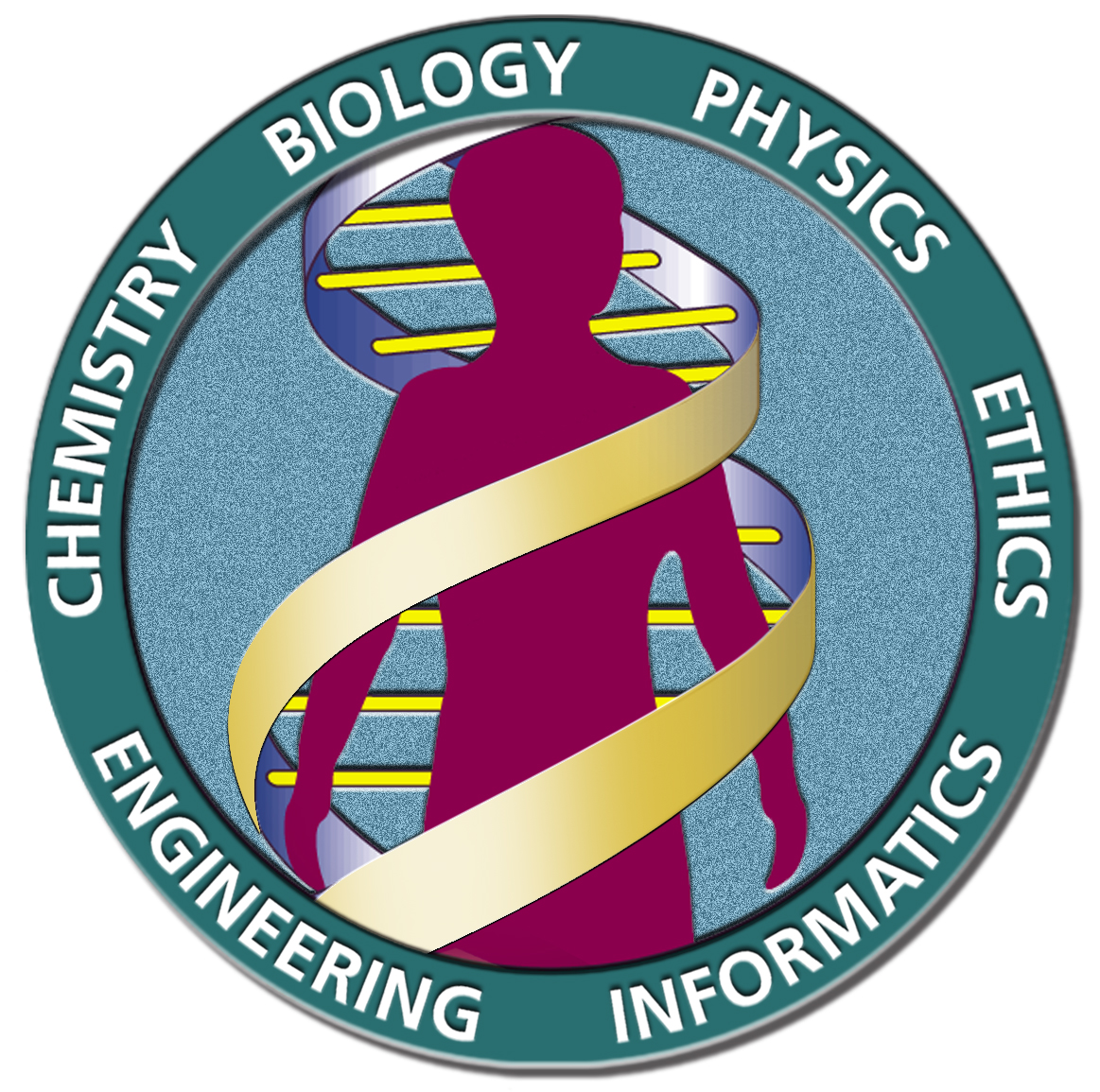2000 DOE Human Genome Program Contractor-Grantee Workshop VIII
Abstract Book PDF
(scanned from original)

Research Abstracts from the DOE Human Genome Program Contractor-Grantee Workshop VIII
February 27-March 2, 2000 Santa Fe, NM
Welcome to the Eighth Contractor-Grantee Workshop sponsored by the Department of Energy (DOE) Genomics Program. This workshop provides a unique opportunity for DOE genome investigators to discuss and share the successes, problems, and challenges of their research as well as new material resources and software capabilities. The meeting also provides scientists and administrative staff with an overview of the program’s progress and content, a chance to assess the impact of new technologies, and, perhaps most important, a forum for initiating new collaborations.
We hope you will take full advantage of the opportunities offered by this meeting and by the beautiful surroundings of the Santa Fe area. Last time we got together we were in Oakland, California, so that you could visit the DOE Joint Genome Institute’s new Production Sequencing Facility in Walnut Creek. This facility was opened officially in the spring of 1999 by Secretary of Energy Bill Richardson.
The 144 abstracts in this booklet describe the most recent activities and accomplishments of grantees and contractors funded by DOE’s long-running human and microbial genome programs, as well as ongoing efforts in model organism and functional genomics research. We also have included talks from invited guests who will discuss related genomics research efforts and opportunities for postgenomic biology enabled by genome research. All projects funded by the Biological and Environmental Research (BER) Program will be represented at poster sessions at the Santa Fe Convention Center on East Marcy Street one block north of the Plaza in the center of Santa Fe, so you will have an opportunity to meet with the researchers who make this program a success. New informatics resources also will be demonstrated at the poster sessions. I urge you to take full advantage of all the formal and informal opportunities for discussion and exchange of information that are available at this workshop.
The main challenge facing the DOE genome program today remains the imperative to sequence to “Bermuda Standards” human chromosomes 5, 16, and 19, which constitute DOE’s commitment to the International Human Genome Project. Three years ago, DOE addressed this challenge by forming the Joint Genome Institute (JGI) under the direction of Elbert Branscomb. Using the complementary strengths of DOE’s three largest genome programs and those at other laboratories and universities, the JGI has made efficient and effective use of diverse expertise and resources to establish a facility for high-throughput sequencing. By the date of this meeting, JGI is expected to have completed the draft sequencing of chromosomes 5, 16, and 19. This represents around 10% (or 250 million base pairs) of the euchromatin in the human genome. In addition, JGI has determined the DNA sequences of two entire microbial genomes, about 4 “finished” Mb. Currently the sequencing rate at the JGI’s Production Sequencing Facility is averaging about 300 million bases of raw sequence per month, a large and remarkable increase over last year.
Although many challenges lie ahead, particularly in anticipating and preparing for the “postgenomic” world, we are more optimistic than ever about the success of this grand project and its many contributions to science and society. Yet we cannot afford to be complacent, and the workshop speakers on ethical, legal, and social implications (ELSI) will remind and challenge all of us that our science has societal impacts that we cannot avoid. We cannot be aloof and disengaged from those interactions. In particular, ELSI must go forward with the active participation of all scientists in the program. ELSI implications are not just research topics for ELSI investigators but real-life issues that need to be considered in the context of genome research today.
There are other genomes to be sequenced besides the human, and the BER Microbial Genome Program continues to contribute complete sequences to public databases–11 complete microbes to date with 11 more in the pipeline. Each microbial sequence has its surprises and its exciting science. The entire 3-Mb sequence of Deinococcus radiodurans, the most radioresistant microbe yet known, was published in Science (November 19, 1999). Its astounding DNA-repair capacities represent longstanding and continuing high-priority DOE interests and the opportunity, perhaps through genetic engineering of toxin-degrading enzyme systems, to address DOE’s mission of mixed-waste remediation. This single example underscores the opportunities that lie ahead to further exploit the interdisciplinary biological approaches that we view as important guiding principles for the science we support. It also reminds us that we must continue to take responsibility for using our science to better our world. The complete sequence of another microbe, Thermotoga maritima, published in the May 27, 1999, issue of Nature, suggested that the swapping of genetic elements by microbes, much as our children might trade Pokemon cards, is more common in evolution than had ever been suspected. Most recently, JGI has completed two genomes of microbes that play enormous roles in carbon-management processes on our planet. You will hear more about these interesting microbes at this workshop.
We look forward to a very interesting and productive meeting and offer our sincere thanks to all the organizers and to you, the scientists, whose vision and efforts have realized and continue to realize the promises of genome research.
Sincerely,
Ari Patrinos
Associate Director of Science for Biological and Environmental Research
Office of Biological and Environmental Research
U.S. Department of Energy
[email protected]
Date Published: February 2000
Prepared for the U.S. Department of Energy, Office of Science, Office of Biological and Environmental Research, Washington, D.C. 20874-1290
Prepared by Human Genome Management Information System
Oak Ridge National Laboratory
Oak Ridge, TN 37830-6480
Managed by LOCKHEED MARTIN ENERGY RESEARCH CORP.
for the U.S. DEPARTMENT OF ENERGY
UNDER CONTRACT DE-AC05-96OR22464
